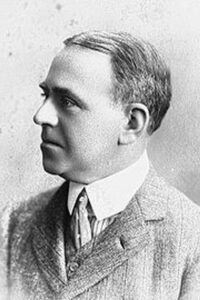
The Missioner
“This agreement with Philip Crooks,” he remarked, “is a somewhat important document. With your permission, madam, I will read it to you.”
She signified her assent and leaned wearily back in her chair. The agent began to read. His mistress watched him through half-closed eyes. His voice, notwithstanding its strong country dialect, had a sort of sing-song intonation. He read earnestly and without removing his eyes from the document. His listener did not attempt to arrive at the sense of the string of words that flowed so monotonously from his lips. She was occupied in making a study of the man. Sturdy and weather-beaten, neatly dressed in country clothes, with a somewhat old-fashioned stock, with trim grey side-whiskers, and a mouth which reminded her somehow of a well-bred foxhound’s, he represented to her, in his cut personality, the changeless side of life, the side of life which she associated with the mighty oaks in her park, and the prehistoric rocks which had become engrafted with the soil of the hills beyond. As she saw him now, so had he seemed to her fifteen years ago. Only what a difference! A volume to her—a paragraph to him! She had gone out into the world—rich, intellectually inquisitive, possessing most of the subtler gifts with which her sex is endowed; and wherever the passionate current of life had flown the swiftest, she had been there, a leader always, seeking ever to satisfy the unquenchable thirst for new experiences and new joys. She had passed from girlhood to womanhood with every nerve of her body strained to catch the emotion of the moment. Always her fingers had been tearing at the cells of life—and one by one they had fallen away. This morning, in the bright sunshine that flooded the great room, she felt somehow tired—tired and withered. Her maid was a fool! The two hours spent at her toilette had been wasted! She felt that her eyes were hollow, her cheeks pale! Fifteen years and the man had not changed a jot. She doubted whether he had ever passed the confines of her estate. She doubted whether he had even had the desire. Wind and sun had tanned his cheeks, his eyes were clear, and his slight stoop was the stoop of the horseman rather than of age. He had the air of a man satisfied with life and his place in it—an attitude which puzzled her. No one in her world was like that! Was it some inborn gift, she wondered, which he possessed, some antidote to the world’s restlessness that he carried with him, or was it merely a lack of intelligence?
He finished reading and folded up the pages, to find her regarding him still with that air of careful attention with which she had listened to his monotonous flow of words. He found her interest surprising.
Read or download Book
E. Phillips Oppenheim
Edward Phillips Oppenheim (22 October 1866 – 3 February 1946) was an English novelist, and a prolific writer of best-selling genre fiction, featuring glamorous characters, international intrigue, and fast action. Notably easy to read, they were viewed as popular entertainment. He was featured on the cover of Time magazine in 1927.
Biography
Edward Phillips Oppenheim was born on 22 October 1866 in Tottenham, London, the son of Henrietta Susannah Temperley Budd and Edward John Oppenheim, a leather merchant. After attending Wyggeston Grammar School until the sixth form in 1883, his family’s finances forced him to withdraw and he worked in his father’s business for almost twenty years. His father subsidized the publication of his first novel, which proved just successful enough to break even. He published five of his novels between 1908 and 1912 under the pseudonym “Anthony Partridge”.
Around 1900, Julien Stevens Ulman (1865–1920), a wealthy New York leather merchant who enjoyed Oppenheim’s books, bought the leather works and made him a salaried director to support his writing career.
He quickly found a successful formula and established his reputation. In 1913, John Buchan, launching his career as a suspense novelist, called Oppenheim “my master in fiction” and “the greatest Jewish writer since Isaiah”. As early as that year, his publishers were bringing out new editions of some of his earlier works to meet, in the words of one trade publication, “the insatiable demand of the public for more stories by him”. It added: “Readers of the author’s recent books will find these first stories of life sketches full of interest, their very crudeness being positively amusing in light of his present finished craftsmanship.”
In 1892 Oppenheim married an American, Elise Clara Hopkins of Easthampton, Massachusetts. They lived in Evington, Leicestershire in what is now The Cedars pub until the First World War and had one daughter. During that war, he worked for the Ministry of Information.
He described his method in 1922: “I create one more or less interesting personality, try to think of some dramatic situation in which he or she might be placed, and use that as the opening of a nebulous chain of events.” He never used an outline: “My characters would resent it.” When he needed villains for his diplomatic and political intrigues he drew on Prussian militarists and anarchists, enough for one reviewer to lament “the baldness of his propaganda”. For example, in A People’s Man (1915), a socialist discovers that his movement is secretly run by German spies.
A 1927 review in The New York Times said he “numbers his admirers in the hundreds of thousands and has one or more of his books on a prominent shelf in almost every home one enters”. He appeared on the cover of Time magazine on 12 September of that same year.
Reviews for his work treated them as entertainment with only a slight relationship to the mystery genre. In 1933, a review of Crooks in the Sunshine explained that “Mr. Oppenheim’s crooks are so polished that they have no difficulty in moving in the very best society…. There is very little mystery in this book, but there is dress-suit crime galore.” In 1936, a review of A Magnificent Hoax, his one-hundredth novel, said: “The hoax is on the reader, who is led, through nearly 300 pages, only to find that nothing very terrible has happened. The explanation takes a bit of believing, but since it extricates several very nice people from what looks like a nasty mess, one is willing to let that pass.” The Shy Plutocrat, published early in World War II, was “a good tale to take your mind off your worries”. Readers came to expect familiar themes, “the peculiar Oppenheim blend of dispatch-box atmosphere, femmes fatales, double traitors, and a tight plot”. In mid-career, The Great Impersonation (1920) was called “his best work”.
Along with dozens of novel and short story collections, he produced an autobiography, The Pool of Memory, in 1942.
Oppenheim’s literary success enabled him to buy a villa on the French Riviera and a yacht, then a house in Guernsey, though he lost access to this during the Second World War. He regained the house, Le Vauquiedor Manor in St. Martins, after the war and died there on 3 February 1946. His wife died there on 25 November.
An assessment that appeared in The New York Times upon his death said: “As he recalls in his pleasant and modest autobiography, all his books were easy to write. They were equally easy to read, especially on a summer vacation when escapist literature is most welcome.” He composed by dictating to a secretary and once produced seven works in a single year. His social set included the characters that populated his novels, where he created “a glamorous world of international intrigue, romance, and plushy society galloping along in swift action and suspense”. One academic study calls him “a talented entertainer”.






